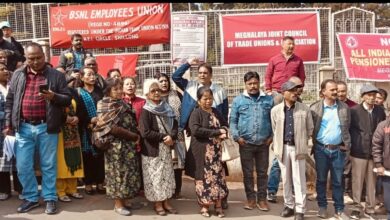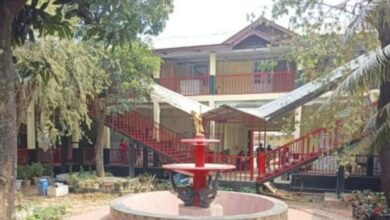
Shillong, Aug 22: Governor CH Vijayashankar on Friday called for the proper implementation of centrally sponsored schemes.
He was speaking at the Vartalap initiative held here, organised by the Press Information Bureau (PIB), Shillong, in collaboration with North Eastern Hill University (NEHU) and the Planning Department, Government of Meghalaya.
The deliberations were on the centrally sponsored schemes in Meghalaya, and a media workshop on ‘Media Laws and Ethics, and Artificial Intelligence at Raj Bhavan.
Addressing the gathering, the governor emphasised the importance of effective utilisation of the centrally sponsored schemes. He said, “Schemes are designed to benefit people, but their success depends on how well they are implemented and how effectively citizens are informed. The union government has placed particular emphasis on the Northeast, and Meghalaya is receiving due attention in agriculture, horticulture, and infrastructure. The bridge between the union and the state is crucial, and the media has a vital role in ensuring that information about these benefits reaches the people.”
In her keynote address, Ampareen Lyngdoh, Minister of Information and Public Relations, Government of Meghalaya, described Vartalap as an important dialogue platform. “This meeting of minds and exchange of ideas is a constructive space that must lead to definitive results, where information about centrally sponsored schemes is properly disseminated through the media to the public. I am grateful to PIB for verifying facts before communication. Often, misrepresentation of facts creates confusion, and that is why the value of authentic information is so important. Meghalaya has been performing strongly in health through NHM and PM-JAY, with over five lakh beneficiaries, as well as in agriculture through PM-Kisan. However, challenges remain, and the media has a vital role in bridging gaps. AI is a powerful tool, but if misused, it can be dangerous. It must be handled responsibly.”
Delivering the welcome address, Kripa Shankar Yadav, Additional Director General, NEZ, Guwahati, set the tone of the workshop by outlining its key agenda. He said, “Vartalap has been designed to bring together discussions on centrally sponsored schemes and a workshop on Artificial Intelligence, along with deliberations on media law and ethics, to enrich the media fraternity and students alike. I thank the state government for its support and extend this programme as a message to the Government of India that the media is keen to engage meaningfully in spreading awareness about schemes and responsibilities that touch people’s lives.”
Prof. S.K. Dixit, Registrar of NEHU, underlined the relevance of the theme in Media Laws and Ethics and AI in a rapidly changing media environment.
“The theme is quite pertinent, and as we all know, information is an important aspect as it impacts our daily lives. The media, considered the fourth pillar of Indian democracy, plays a crucial role in informing the public about their rights and the work of different ministries, ultimately contributing to the development of society. Freedom of the press is important, but it also comes with responsibility.” He added that Indian media laws must be viewed afresh in the context of new technologies and that the student community and media practitioners need to deliberate on these challenges.
Richard Zongte, Director IPR, North Eastern Council, gave a presentation on the recent projects being implemented by the Council.
Speaking on the centrally sponsored schemes in Meghalaya, Vijay Kumar Mantri, Commissioner and Secretary, Department of Information and Public Relations, Government of Meghalaya, gave a presentation on the progress achieved in key sectors with centrally sponsored schemes. “Schemes have been redesigned, new schemes introduced, and the media need to know about these changes. In Meghalaya, synergy between the state government and the Government of India is vital for success. We have set 2032 as the next milestone year when Meghalaya completes 60 years of statehood, identifying ten opportunities to strengthen connectivity, water, power, internet, housing, health, nutrition, and education.”
He elaborated on the achievements under schemes such as PM-Kisan Samman Nidhi with 74 percent coverage in the state, Ayushman Bharat, PMAY, Jal Jeevan Mission, which has achieved remarkable progress from zero coverage seven years ago, and PM Poshan that now covers over 7,700 schools. “From agriculture to infrastructure, health education, Meghalaya has moved from an ‘aspirer state’ to a ‘fast mover state’,” he said.
B.D.R. Tiwari, Commissioner and Secretary to the Governor, emphasised the role of governance in driving holistic development. He stated, “The focus has moved from production sectors to social infrastructure and employment generation. Every sector supports agriculture and food security, and flagship programmes have enabled Meghalaya to emerge as a leading state in implementing government schemes. The center-state partnership, along with initiatives like Make in India, Skill India, Startup India, and Digital India, is steering the nation toward self-reliance in the Amrit Kaal.”
Women’s representative Anita Nongkhlaw, President of Seng Longkmie Madanriting, Shillong, expressed appreciation for the government’s support to women and children. Sharing her experience, she said, “We welcome the government’s focus on below poverty line families, health, sanitation, nutrition, and empowerment of women. Initiatives such as PM Poshan and self-help group programmes in villages have made a tangible difference. Women’s economic empowerment must be strengthened further with greater awareness of schemes and better guidance.”
The workshop concluded with technical sessions on Artificial Intelligence for digital readiness by Prof. Suresh Chandra Nayak, and on Media Laws and Ethics by Advocate Melamshwa Allya, followed by a panel discussion featuring leading media professionals and academicians, led by Kamaljit Chirom, Department of Journalism and Mass Communication, NEHU, Patricia Mukhim, Editor, The Shillong Times, Oineetom Ojah, Associate Editor, North East Live, and Prof. H. Srikanth, Department of Political Science, NEHU. The deliberations focused on the ethical use of technology, the responsibility of the press, and the role of media in strengthening democratic values.
Journalists, students, researchers, professors from various universities and senior officials from the state government and the North Eastern Council attended the programme.





